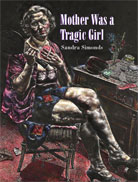|

Mother Was a Tragic Girl
Sandra Simonds
Cleveland State University Poetry Center
2012
$15.95
It’s tempting to think of Sandra Simonds’ poems as frantic miniatures of mania, given her inventive sense of space and language, her wide-ranging reserve of cultural, historical, and scientific reference. Some of her poems bridge the gap between sarcasm and accusation. In fact, lines like these wink at you while they slap you on the wrist with one hand and chain you to your chair with the other. Consider the opening of “A Talented Engraver from Delft”:
Oh no you’re not supposed to fuck your first cousin,
expert on Reform Era pamphlets,
or eat an oatmeal-flavored Powerbar on
the toilet.
The opening line of the book, from a poem entitled “Used White Wife,” states it more plainly: “It is absolutely unnecessary to write serious poetry.” What follows in nearly every poem going forward insists on the truth of such a claim while it sends that same claim through the paper shredder. I don’t want to suggest that Simonds’ work juxtaposes the sacred and profane. But I would suggest that her poems both advocate intellect and satirize intellect, and often she uses the profane to accomplish the second of those perhaps contradictory purposes. And, for the reader, she creates an incredibly entertaining poem, where anything is welcome and possible and subject to sarcasm.
In the end, her poems are hardly manic. A better description might focus on their tautness, how each syllable is a careful construction. For example, a long sequence in the middle of the book turns its attention to formal concerns, as nearly each poem of “Strays: A Love Story” is an acrostic of a line from George Oppen or William Blake. The self-imposed formality, which for all intents and purpose is only known to us and impacts our reading because Simonds has informed us of its existence in the book’s notes, suits exactly the poem’s larger thematic concerns: the trials of marriage and domesticity (another self-imposed formality) in the 21st century. Two characters dominate the sequence: Husband and Wife. They head in opposite directions: Husband into the arms of reticence or the paws of his cherished dog, Wife into the arms of a high-school aged cashier at the local pharmacy:
Then Wife begins to sleep with her son’s uh oh Pediatrician.
Washed out waiting room. Two mothers exchange stories of their
irritating children who battle ADHD.
Sit still. Uh oh, the kids spill their candies all over the white
tile floor. They roll, scatter,
ignite: Wife begins to wonder:
Now, am I cheating on uh oh Cashier, Husband or Pediatrician?
From the start, you know there’s no Happily Ever After on the horizon, even when the drama subsides. After all, one of the poems of the sequence concludes, “There is no return address.” Yet, Simonds explores the contradictions of each character with incredible pathos. Her approach to human complexity is refreshing, and she seems to suggest why in the concluding section of the sequence: “Because it is fully impossible to comprehend the…intricacies that entwine beast and man.”
In fact, the bravery and forthrightness that defines these poems extends to aspects of domesticity that most often get described in cliché language, if not outright sentimentality. Not so in the hands of Simonds. My favorite moments of the book are the ones where the point of view seems exclusively that of the poet, personal poems that address personal concerns and experiences which I imagine (I could be wrong!) are Simonds own concerns and experiences, at least metaphorically if not literally. A poem like “Yoga” earlier in the book does this, and so does “Lines Written on the Nursery Wall” in the book’s final section, a poem that ends in an imperative I wish would be on a t shirt and part of a politician’s dress code instead of a crisply-ironed shirt or power suit, worn as a constant reminder of the ethical responsibility we all owe to one another:
The world works
but not today. Not for me. Fever and the walls
painted with sharks and starfish.
There is so much aqua, histamine.
Buddha, bring me another
slice of pineapple.
You won’t find wisdom like that anywhere else but in poems. And you won’t find poems like these anywhere else in poetry.
--Jay Robinson
Jay Robinson is a Visiting Professor of English at Ashland University; he’s also taught Creative Writing and English Composition at The University of Akron. Along with Mary Biddinger, he’s Co-Editor-in-Chief of Barn Owl Review. Poems have appeared in 32 Poems, Anti-, The Laurel Review, and North American Review, among others. Prose has appeared in Poetry and Whiskey Island.
Also by Jay Robinson:
Review of Fuse by Marc McKee
Review of The Silhouettes by Lily Ladewig
|
|

